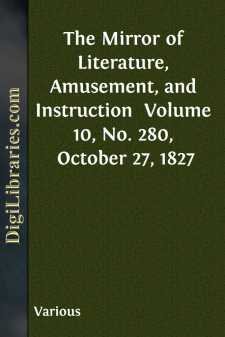Categories
- Antiques & Collectibles 13
- Architecture 36
- Art 48
- Bibles 22
- Biography & Autobiography 813
- Body, Mind & Spirit 142
- Business & Economics 28
- Children's Books 15
- Children's Fiction 12
- Computers 4
- Cooking 94
- Crafts & Hobbies 4
- Drama 346
- Education 46
- Family & Relationships 57
- Fiction 11828
- Games 19
- Gardening 17
- Health & Fitness 34
- History 1377
- House & Home 1
- Humor 147
- Juvenile Fiction 1873
- Juvenile Nonfiction 202
- Language Arts & Disciplines 88
- Law 16
- Literary Collections 686
- Literary Criticism 179
- Mathematics 13
- Medical 41
- Music 40
- Nature 179
- Non-Classifiable 1768
- Performing Arts 7
- Periodicals 1453
- Philosophy 64
- Photography 2
- Poetry 896
- Political Science 203
- Psychology 42
- Reference 154
- Religion 513
- Science 126
- Self-Help 84
- Social Science 81
- Sports & Recreation 34
- Study Aids 3
- Technology & Engineering 59
- Transportation 23
- Travel 463
- True Crime 29
The Mirror of Literature, Amusement, and Instruction Volume 10, No. 280, October 27, 1827
by: Various
Categories:
Description:
Excerpt
THE SELECTOR,
AND
LITERARY NOTICES OF
NEW WORKS.
CHRONICLES OF THE CANONGATE.
(By the author of Waverley.)[We have the pleasure of submitting to our readers, (almost entire,) one of the stories of the forthcoming Chronicles of the Canongate, it being the second narrative, and the last in the first volume, and as well as the others, founded on true incidents. The Chronicles are domestic tales; but the Two Drovers should not be taken as a specimen of the work. Slender as are its incidents, it proves that "Richard (or Walter) is himself again," for in no vein of writing is the author of Waverley more felicitous than in delineating scenes of actual life, splendid as are his narratives of the fairy scenes and halls of romance: and in the prevailing taste for this description of writing, we think the Chronicles of the Canongate bid fair to enjoy popularity equal to any of Sir Walter's previous productions.]
It was the day after the Doune Fair when my story commences. It had been a brisk market, several dealers had attended from the northern and midland counties in England, and the English money had flown so merrily about as to gladden the hearts of the Highland farmers. Many large droves were about to set off for England, under the protection of their owners, or of the topsmen whom they employed in the tedious, laborious and responsible office of driving the cattle for many hundred miles, from the market where they had been purchased, to the fields or farm-yards where they were to be fattened for the shambles.
Of the number who left Doune in the morning, and with the purpose we have described, not a Glunamie of them all cocked his bonnet more briskly, or gartered his tartan hose under knee over a pair of more promising spiogs (legs), than did Robin Oig M'Combich, called familiarly Robin Oig, that is Young, or the Lesser, Robin. Though small of stature, as the epithet Oig implies, and not very strongly limbed, he was as light and alert as one of the deer of his mountains. He had an elasticity of step, which, in the course of a long march, made many a stout fellow envy him; and the manner in which he busked his plaid and adjusted his bonnet, argued a consciousness that so smart a John Highlandman as himself would not pass unnoticed among the Lowland lasses. The ruddy cheek, red lips, and white teeth, set off a countenance which had gained by exposure to the weather, a healthful and hardy rather than a rugged hue. If Robin Oig did not laugh, or even smile frequently, as indeed is not the practice among his countrymen, his bright eyes usually gleamed from under his bonnet with an expression of cheerfulness ready to be turned into mirth.
The departure of Robin Oig was an incident in the little town, in and near which he had many friends male and female. He was a topping person in his way, transacted considerable business on his own behalf, and was intrusted by the best farmers in the Highlands, in preference to any other drover in that district. He might have increased his business to any extent had he condescended to manage it by deputy; but except a lad or two, sister's sons of his own, Robin rejected the idea of assistance, conscious, perhaps how much his reputation depended upon his attending in person to the practical discharge of his duty in every instance....












